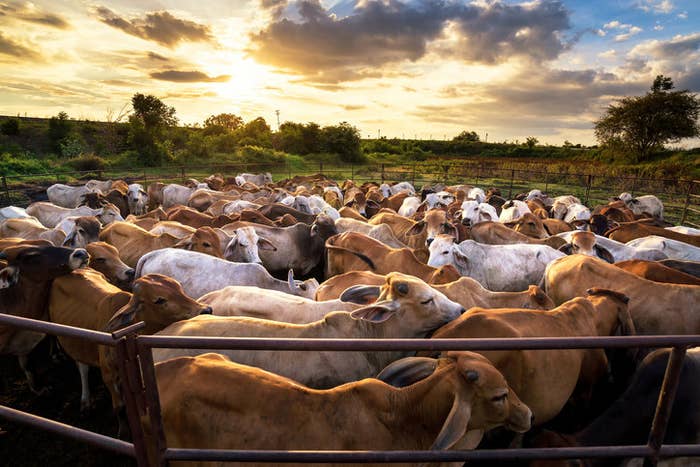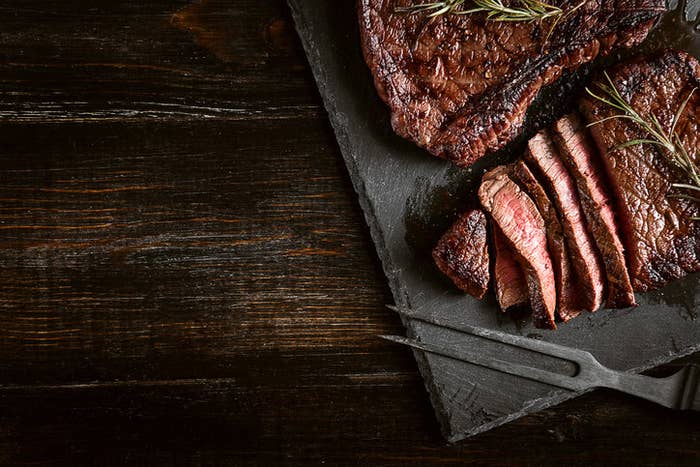
Around 300,000 people worldwide are expected to sign up to the annual international campaign "Veganuary" this year, which asks people to stick to a vegan diet for the first month of 2019.
Veganuary is a British initiative launched in 2014 that provides pledgers with meal plans, shopping guides, advice, and support to complete the challenge.
In 2018 the organisation attracted over 168,000 people worldwide to pledge, which was a 183% increase from 2017. Veganuary's Facebook page currently has over 230,000 followers.
Rich Hardy, the head of campaigns at Veganuary, told the Guardian that warnings from environmental scientists about the impact of meat consumption on climate change may be behind the rise in interest in veganism.
Lisa Chalk from Animals Australia told BuzzFeed News that the United Nations' Intergovernmental Panel on Climate Change (IPCC) report released in October last year piqued interest in making individual changes in diet.
The IPCC report included suggestions for individual changes to help cap global temperature rise to the aspirational limit of 1.5ºC set by the 2015 Paris Climate Agreement, such as eating less meat, flying less, and avoiding travel in cars.
"Climate change and environmental concerns are definitely a strong motivator for people eating more plant-based food … for the health of the planet there are compelling reasons to reimagine the food we use to fuel our bodies," said Chalk.
One study led by Lancaster University in 2013 found that cutting out meat from an individual's diet reduces their greenhouse gas emissions by 35%, and substituting carbon-intensive meats such as beef and lamb with chicken or pork can reduce one person's emissions contribution by 18%.
A study published in October last year, led by Oxford University, observed the global impact of food consumption on the environment with data from every country and suggested that the average person must eat 75% less beef and 90% less pork to prevent the global rise in temperature above 2ºC this century.
Marco Springmann, who led the study, proposed a food tax to reflect the emissions cost of production, which would result in a 40% increase in the price of beef and a 20% increase in the price of other meats.
Less Meat Less Heat is an Australian vegan organisation whose members describe themselves as “Climatarians”, because their goal of reducing meat consumption is not driven by ethical treatment of the animals, which is the primary concern of most vegan organisations, including Animals Australia.
Less Meat Less Heat runs an initiative known as the Climatarian Challenge, encouraging users of its app to eat based on an allotment of carbon points, citing that 50% of Australian greenhouse gas emissions come from livestock agriculture.
Professor Richard Eckard, director of the Primary Industries Climate Challenges Centre at the University of Melbourne, told BuzzFeed News that the primary concern with greenhouse gas emissions from the livestock industry is the release of methane through cow burps and flatulence.
Methane is a short-lived greenhouse gas (it disappears from the atmosphere after 12 years, while carbon dioxide and nitrous oxide will take over a century) but it heats the atmosphere 86 times more than carbon dioxide.
In Australia methane from the agricultural sector accounts for approximately 10% of the country's greenhouse gas emissions and globally, livestock accounts for 14.5% of emissions.
Eckard refers to a reduction in methane as a "get-out-of-jail card" because real reductions in methane production will help to reduce global warming in the short term.
However, Eckard notes that there are cultural and socioeconomic complications that make simply cutting out meat extremely difficult. According to the Organisation for Economic Co-operation and Development (OECD), the global middle class will see an increase from 1.8 billion in 2009 to 4.9 billion by 2030. A growing middle class means a growing demand for meat and, according to projections, by 2050 the world's demand for livestock meat may be 1.8 times higher than in 2010.

Eckard believes this middle-class demand for meat is driven by a Western perception of wealth, and a cultural shift needs to occur before it is acceptable to sacrifice meat-eating.
"We've created this perception that you drive your own car, you have your own house, and you eat meat, so perhaps the solution lies with us in changing the rising world's perception of the middle class as to what an affluent diet should look like," he said.
Eckard says cattle raising is an important economic foundation for many rural and indigenous communities, so alongside a reduction in meat consumption, he advocates for the development of low-methane livestock.
"We're in a situation in Australia where a lot of Aboriginal people have lost their traditional land rights, traditional hunting rights, and traditional food sources, and now livestock has become their traditional protein source.
"So we've got to recognise that and then offer them a way of doing that that is more benign on the environment."
One method of creating cattle with low methane output is by genetically altering cows so that the microbiome in the first part of their stomach (the rumen) that breaks down grass creates less methane output when a cow burps.
Organisations such as Genome Canada have already begun gene sequencing programs to identify and breed cows that produce less methane.
"What we've got to try and do is produce solutions not just for ourselves, we've got to produce solutions that are across the world and can be intergenerational in poorer socioeconomic environments," said Eckard.
